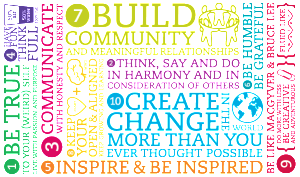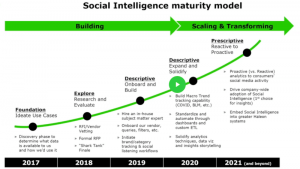What does it require to take your business or personal life from Good to Great?
I have found in my research and experience the same traits that create a great personal life also create a powerful business life. What’s good for you personally is good for your business as both are intimately connected to people. A company is a living, breathing, entity, just as you are, made up of collective parts that create a whole. It exists within a sphere of relationships, just as you are.
From time to time you’ll see articles written by me in my “Good to Great” series. Today’s article is on creating Core Values. I’ve written it from the corporate perspective, however, even if you don’t own or lead a company, you likely work for one, and knowing the information I’m sharing here is a step forward for you to be an even better version of yourself whether you’re the CEO or at the bottom of the organizational chart. The research and ideas listed here can also be used to cultivate awareness which serves to support you in your journey to be a better human being. What I have come to understand in my experience over the past 25 years researching and speaking on personal and business relationships, is that the skills and techniques that make better organizations also make better people.

In today’s world, we are moving into a post-consumer age called the relationship economy. With the widespread use of the internet, instant global communications and most dramatically, social media, we are entering an era defined by two-way relationships between brands and bodies. Today’s consumer wants to be heard, whether it’s to voice a concern to management or request a particular color image on their laptop case. Transactions are being defined by emotions and relationships not just dollars and cents.
According to Forbes Magazine, 78% of consumers say that posts made by companies on social media influence their purchases and an even greater 81% say that posts made by their friends influence their purchasing decisions. This result was from a 2012 survey. One can only imagine with the continued permeation of social media into all aspects of our lives that this number has only increased. Relationships drive purchase decisions. Purchases are the lifeblood of every company.
With this knowledge, how does an enterprise go from Good to Great? We build relationships. True two-way relationships which interact regularly with customers to receive and act on their input. The customers of today are much more savvy then in years past and expect company’s to pay attention to them. They also have instantaneous and much louder methods for voicing their displeasure as well as their support. (Case in point, the recent media exposure regarding Southwest Airlines and a gentleman and his two young daughters that were booted off a flight for the father Tweeting his displeasure about a rude gate agent. Allegedly the gate agent made him de-plane, and insisted that he delete his Tweet on Twitter before being allowed to re-board and fly. Click for the full article here by ABC News.)
With the Relationship Economy in-mind I’ve laid out the 5 V’s of building a Great Enterprise. The 5 V’s are:
1. Values: Create Core Values
2. Vision: Engage An Effective Vision
3. Validate: Validate Your Employees
4. Village: Build A Village Through Relationships
5. Voice: Listen To The Voice Of Your Current And Potential Customers.
These 5 V’s: Values, Vision, Validation, Village, and Voice, are built around the concept of improving relationships inside and outside of the company. In fact, the 5 V’s are closely based on my RelationShift® model of success and reflect the importance I put on positive, uplifting relationships in both our personal and business lives.
 In this article I will speak on concept one: Values.
In this article I will speak on concept one: Values.
Creating and understanding your Core Values are critical for any organization. Beyond a vision, an entity’s Core Values are what drive everything within a company. From marketing, creation, fabrication, production, research, sales, customer service, delivery, finance, and more, the Core Values of a company steer the rudder of the organization through both still and turbulent waters. Core Values determine what and how a company will sell its product or services. They determine how a company will contribute to its employees and community. Most importantly, the Core Values drive not only C-Level, but customer-connected decision making.
In the new Relationship Model of economics, a company’s Core Values offer an opportunity for customers to buy into the brand, to become a “part of the family” so-to-speak. It also allows an informed and inspired workforce to interact with customers from a deeper level of awareness. This awareness creates an environment for entrepreneurial and proactive decision making and interaction with customers, meeting their needs in a timely and empowered manner.
 “Those who say their company’s values are known and understood are 30x more likely to be fully engaged,” according to Don MacPherson, CEO of pollster Modern Survey.
“Those who say their company’s values are known and understood are 30x more likely to be fully engaged,” according to Don MacPherson, CEO of pollster Modern Survey.
The problem with many companies today entering the Relationship Economy is that their employees don’t understand the organizations Core Values. A recent found that:
The problem with many companies today entering the Relationship Economy is that their employees don’t understand the organizations Core Values. A recent gallup poll found that:
“About four in 10 (41%) workers, for example, strongly agree with the statement “I know what my company stands for and what makes our brand(s) different from our competitors.”
Concurring with the findings from Gallup was the 2013 annual business survey from TinyPulse.com and Modern Survey. They also found:
“Only 42% of employees knew their organization’s vision, mission, and values.”
These results were virtually identical to those found by Gallup helping to validate the results of both polling organizations.
This evidence may also point out to the discrepancies between the leading companies in corporate America and the rest who seem to be mired in the trailing pack. When you consider from your own personal experience interacting with employees of leading companies, one of the characteristics that almost always stands out is your trust in them, because these employees take ownership of their company’s Core Values. Consumer trust equals sales conversions and brand loyalty.
The importance of defining and then educating employees on an organization’s Core Values are critical to success in the Relationship Economy.
Business & Finance Articles on Business 2 Community
(352)
Report Post





